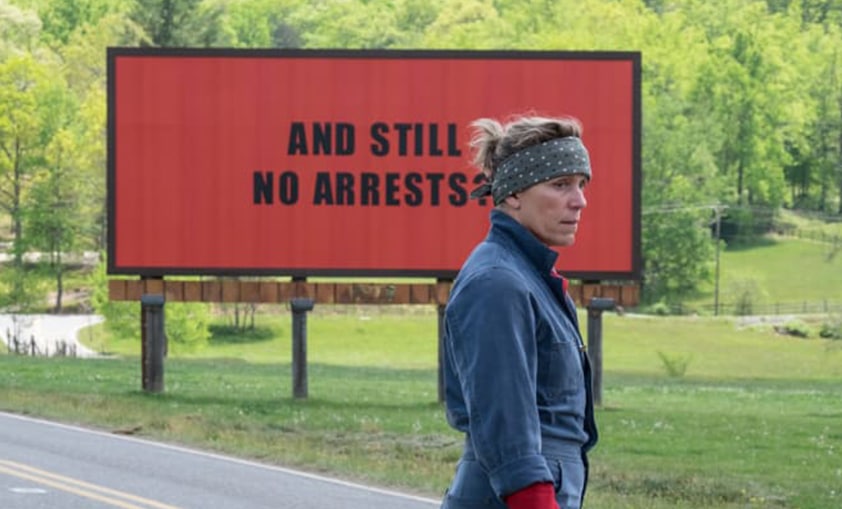DATEWORTHY? YES, BUT…

This powerful film combines extremely dark comedy with powerful drama and deep themes about how we process violent death, forgiveness and the chance for redemption in even our darkest moments. It’s a potential classic likely to score numerous major Oscars, but it is emotionally intense and features a LOT of foul language and a couple of brutally realistic beatings that are integral to the plot. So go! But if you’re easily offended by language, you’ve been warned.
The Next Great Dark Comedy

Sometimes it takes an outsider to help you see your own life from a fresh perspective, and that’s certainly the case in the new movie “Three Billboards Outside Ebbing, Missouri.” Written and directed by British playwright-turned-filmmaker Martin McDonagh, who received a Best Original Screenplay Oscar nomination for his 2008 debut film “In Bruges,” “Billboards” offers a powerful portrait of three-dimensional people finding different ways to deal with intense personal pain in the heartland of America.
And even more remarkably, he manages to do it in a way that features some of the biggest belly laughs of the year, incredibly touching moments and edge-of-your-seat excitement. Where “In Bruges” found its Oscar count limited to one nomination, this easily could be one of the heavy hitters in this year’s Oscar race.
If you’re open to having a thought-provoking date film that will get you talking for hours, great! If you’re the kind of person who prefers lighthearted fare for easygoing romance, think twice.
Tongue That Would Clip a Hedge

The film opens on an embittered middle-aged mother named Mildred (Frances McDormand, in a role that both recalls and surpasses her classic turn in “Fargo”), as she notices a trio of decrepit billboards on the outskirts of her hometown of Ebbing, Missouri. Her teenage daughter was brutally raped and murdered seven months before, and the sheriff (Woody Harrelson) and his underlings have proven unable to solve the sordid crime.
Mildred decides to rent the billboards to display a series of confrontational messages aimed to shame the sheriff into finally solving the crime. However, a series of unexpected consequences and shocking twists occur as the townspeople react badly to the disturbing signs.
Along the way, Mildred has angry encounters with a local priest who chides her to take down the billboards and move on and proceeds through a complicated set of interactions with the sheriff that ultimately lead to forgiveness and emotional growth for her but surprising results for him. The most intriguing relationship is between Mildred and a violent, racist cop (Sam Rockwell), who has to find a way to redeem himself after he goes on a rampage and loses his job.
Small Town Full of Vivid Characters

Throughout, she encounters a colorful array of characters that make this movie seem like a lost classic from the Coen Brothers. He specializes in movies that deal with moral conflicts centered around bursts of intense violence, but as unsettling as the violence depicted can be, it’s worth noting that he’s one of the few filmmakers who actually show the impact of violence in all its ugly reality.
“Billboards” takes an extremely dark and sad premise – that of a mother seeking justice after an unimaginable loss – and turns it into a powerful exploration of justice, forgiveness, and second chances. Yet he also manages to find wickedly funny moments in the quirky details of his characters, their locations and their turns of speech, with some of the best monologues this side of “Bull Durham.”
McDormand is a force of nature, by turns feisty with fury and crushed by loss. But Harrelson might have pulled off the performance of his career and a Best Supporting Actor Oscar with his depiction of a lawman who seems to be heartlessly sexist at the beginning but reveals himself to be so much more as the film goes on.
These two are matched note for note by Rockwell in one of the most complex characterizations of the macho mindset and corrupt cops that have ever graced the screen. Viewers will not see any single moment of his character’s actions coming, and it’s a performance for the ages.
Not for the Faint of Heart

The one caveat I might offer against this film is that it contains an unusually heavy amount of profanity and obscenities. There are a LOT of F-words and all sorts of obscene insults woven throughout the dialogue that nonetheless is utterly brilliant for those who can stomach it.
There is also a scene in which a frustrated Mildred verbally attacks a priest after he asks her to take the signs down, and makes several biting comments that seem quite anti-Catholic. But the overall movie is so strong that this could be considered an aberration.
On the other hand, there are also moments of unparalleled eloquence; in particular, a heartbreaking sequence in which Harrelson narrates a letter he wrote to his wife. This is a movie that while colorful and utterly memorable, is filled with shades of grey, leaving viewers to make their own moral analyses of the complex motivations involved. That is an utter rarity in Hollywood today.
I’m calling it now: “Three Billboards” will be nominated for Best Original Screenplay, Best Actress, Best Supporting Actor for both Rockwell and Harrelson, Best Director and, yes, Best Picture. It’s hands-down the film to beat this year for quality and classic status.



